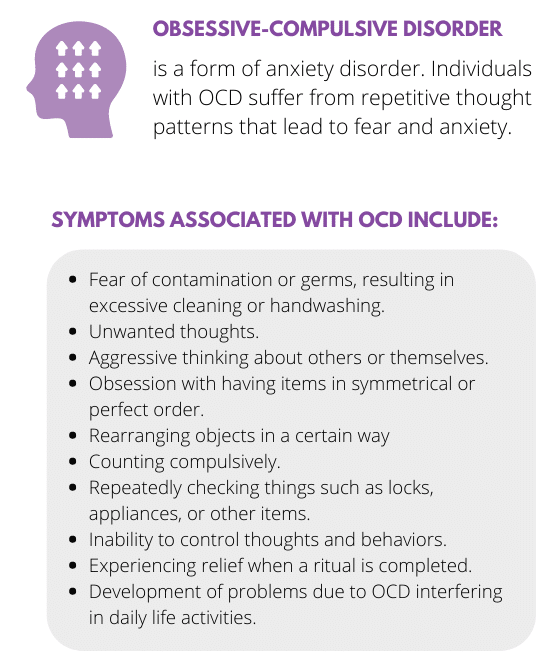Obsessive-compulsive disorder (OCD) is a form of anxiety disorder. Individuals with OCD suffer from repetitive thought patterns that lead to fear and anxiety. These individuals will frequently demonstrate ritualistic behavior patterns that are unique to each person. Doing these rituals provides temporary relief, but anxiety often returns shortly after they are done. Like any anxiety disorder, OCD can be destructive to one’s quality of life. It can interrupt their thoughts and prevent individuals from fully enjoying life.
Unfortunately, approximately one-quarter of people who suffer from OCD also suffer from a substance use disorder.[1] Many begin to abuse substances in an attempt to cope with their anxiety and fear. However, abusing drugs and alcohol to cope with mental health conditions is counterintuitive. Substance abuse can not only lead to addiction, but it can make symptoms of OCD worsen over time.
Table of Contents
ToggleWhat is Obsessive-Compulsive Disorder?
The National Institute of Mental health defines OCD as “a common, chronic, and long-lasting disorder in which a person has uncontrollable, reoccurring thoughts (obsessions) and behaviors (compulsions) that he or she feels the urge to repeat over and over.” These obsessions can seem relentless and may cause overwhelming anxiety and fear. Due to these feelings, people who suffer from OCD often have intense compulsions to behave a certain way in an attempt to get rid of their fear and anxiety.[2]

OCD affects men, women, and children alike. Approximately 1 in 40 adults and 1 in 100 children in the United States suffer from OCD.[3]
Many people who suffer from OCD are unable to recognize that their behaviors are unusual. However, when OCD begins to decrease an individual’s quality of life, seeking treatment is of utmost importance. After all, OCD is a completely treatable disorder.
Although symptoms may come and go, it is common for people with OCD to turn to drugs or alcohol to calm their nerves and settle their minds.
Understanding OCD and Addiction
While an estimated 20% of people with anxiety disorders also suffer from a substance use disorder, the comorbidity rate of OCD and addiction is slightly higher at 25%. Many people who experience anxiety find that their anxiety gets better when they take a drink or a drug. Unfortunately, this can turn into a dangerous habit. In fact, abusing drugs or alcohol to mask symptoms of an anxiety disorder usually makes symptoms worse. It can also increase the problems associated with OCD over time.
If drug and alcohol abuse becomes habitual, it can easily progress into addiction or alcoholism. Addiction alone is actually a compulsive condition, as it is characterized by the obsession to drink or drug and the compulsive behaviors that occur when doing so. Therefore, the two conditions, OCD and addiction, can end up exacerbating one another.
Treating OCD and Addiction
Treating co-occurring OCD and addiction can be challenging, yet immensely rewarding. Although checking into treatment can be terrifying, it is crucial to the healing process. Going to treatment for addiction and OCD involves letting go of one’s usual environment and going to one that is new and uncontrollable. Obsessive thoughts and anxiety are likely to occur, causing it to be difficult to focus on treatment. Fortunately, dual diagnosis treatment centers that specialize in compulsive disorders are fully equipped to handle these situations.
Medication and behavioral therapies are the most popular, effective tools to use when treating OCD and addiction. Therapies like Cognitive Behavioral Therapy (CBT) and Dialectical Behavioral Therapy (DBT) can teach individuals how to identify and modify their behaviors. In addition, group and individual therapies can be beneficial as well. Through therapy and a support group, those who are suffering from addiction and OCD can learn how to cope with their symptoms in a healthy way and begin to live a healthy, sober lifestyle.
Dual Diagnosis Treatment at Agape Treatment Center
Agape Treatment Center in Fort Lauderdale, FL is experienced in treating compulsive disorders and addiction. As a trusted dual diagnosis facility, we are fully equipped with compassionate, professional staff members who are committed to helping each and every individual heal from their co-occurring disorders. Using a holistic approach, we treat the mind, body, and soul, allowing individuals to heal each aspect of their lives that have been touched by OCD and addiction. In this whole-body approach, our programs address physical, nutritional, chemical, environmental, emotional, social, and lifestyle values.
“We are a leading force in transforming the way the world sees and treats clients with substance use, trauma, impulsive and compulsive disorders. By creating a tranquil, nurturing Partial Hospitalization Program and Intensive Outpatient Centers to enhance our current Sober Living Environment, we hope to deliver the missing piece in the “recovery jigsaw puzzle” to rebuild and even save lives using advanced integrative methodologies.”
If you or a loved one is suffering from addiction and OCD, don’t delay treatment any longer. Seek the help you deserve by contacting our specialists at Agape today.
References:







